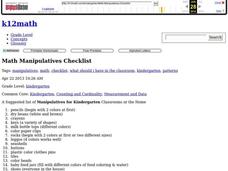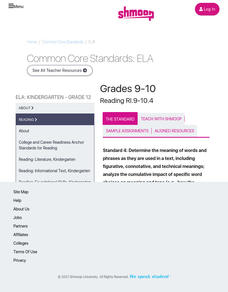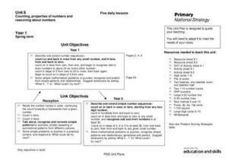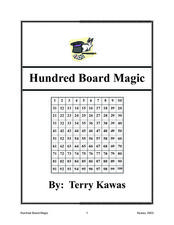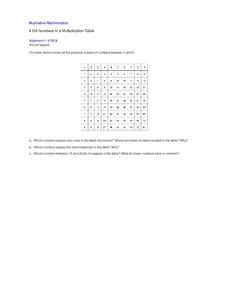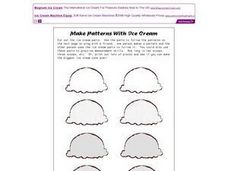Curated OER
Identifying Patterns
Investigators examine the clues to complete 17 sequences by skip counting backwards. There are two examples to get them started, and all of these patterns include the first three numbers but are missing the last five. If you want...
Curated OER
Patterned Leaf Cloths
Students identify and reproduce simple patterns (e.g., red blocks alternating with blue blocks; clap-clap-stamp) and create and extend simple patterns using a variety of materials or actions (e.g., popsicle sticks, pebbles, stickers,...
Curated OER
Patterns
Explore early algebra by participating in a pattern identification activity using a random assortment of different household materials. The class creates, completes, and analyzes different patterns with the help of leggos, buttons,...
Shmoop
ELA.CCSS.ELA-Literacy.RI.9-10.4
Your pupils will be expected to determine the meaning of words and how those words affect the meaning of a text. Help them master this skill with the ideas listed here. First, look over the two activities that could be used for your...
West Contra Costa Unified School District
The Power of Ten: Building a Magnitude Model
Add visual representation to teaching place value with a magnitude model. Using adding machine tape, pupils build a linear place value strip from 1 to 100.
Carson-Dellosa Publishing
Boho Birds Bulletin Board
Maybe you're studying the life cycle of a bird, or maybe you're doing an author study in language arts. Whatever the case may be, use a set of bulletin board ideas any time of the year. Tailor the provided ideas to make them your...
Curated OER
Make Your Own Pattern
In this early childhood understanding patterns worksheet, students find the pattern in 3 problems and then show each another way. Students also explain how they decided what pattern to make in 1 of the problems.
Curated OER
Adding Tens
Second graders explore and discuss adding 10 as they predict number patterns with the hundred chart. They work in pairs, groups choose a number, 1-9, and predict what happens if they add 10 to the number. Students make-a-ten strategy...
Curated OER
Ordering
Four sequences are missing some numbers; can your scholars fill them in? These aviation-themed number sequences require skip counting and counting backward. Beside each pattern learners can reference a jumbled set of numbers inside a...
Curated OER
Roman Numeration
Gain a deeper understanding of the base 10 system through practicing conversion to Roman numerals through one million. The class is taught how to read the numerals through modeling and guided practice. This lesson includes a homework...
Curated OER
Marshmallow Fun Day - math
Early learners rotate to different classroom centers and participate in six activities based on using marshmallows to review concepts learned. They make: marshmallow sculptures (geometric shapes), the shape of mittens using colored...
Curated OER
First Grade Math
In this math review worksheet, 1st graders answer multiple choice questions about patterns, money, and more. Students answer 16 questions.
Curated OER
Counting, Properties of Numbers, and Reasoning about Numbers
Five days of lessons develop number sense and counting patterns, including odd and even numbers, 5s and 10s, doubles, and ways to make 10. Each session opens with fun finger play to reinforce counting and reasoning about numbers. Various...
Curated OER
Multiplication Tables: 9's Tricks
Who knew two hands could solve so many problems? Kids learn the 9's times tables trick with their fingers, then work through a series of 9's related math problems intended on building strong number sense and pattern recognition. Great...
Curated OER
Hundred Board Magic
Move around the hundred board to detect number patterns and relationships! This set of worksheets might actually work magic for your mathematicians as they begin to grasp the significance of the hundred board. For each of these, they...
Curated OER
Multiples
Explore multiples of three and four with 18 sets of numbers. Learners examine each row and circle the multiples of three (for the first nine) and four (for the last nine). There is an example as reference, however none of these are...
Curated OER
Butterflies Fly!
Chopin was a lovely composer who played the piano masterfully. Third graders are introduced to Chopin, his piano sounds, triple meter, music patterns, movement, and the waltz. They listen to his music while hearing the story Butterflies...
Curated OER
Palindromes
In this math worksheet, students solve 56 multiplication problems. Students read about palindromes and discover patterns in multiplying by 11's and multiplying 8-digit numbers.
Illustrative Mathematics
Numbers in a Multiplication Table
Identifying patterns is a crucial skill for all mathematicians, young and old. Explore the multiplication table with your class, using patterns and symmetry to teach about square numbers, prime numbers, and the commutative and identity...
Curated OER
Let's Review for Better Achievement
Seventh graders create goals using two or more skills they have identified to help them improve academic achievement. They discuss the question: What choices do you make that affect your grades? Students listen to the story of Sam the...
Curated OER
Patterning Fun
Students practice making patterns with paint and stamps. In this arts and crafts lesson plan, students utilize the floor of their classroom to create a giant pattern on the floor using different colored paints and foam stamps....
Curated OER
Make Patterns With Ice Cream
In this ice cream patterns worksheet, students cut out ten scoops of ice cream and two cones. Students team up with a partner and exchange matching different patterns for the other one to model.
Curated OER
Math Series: Number Patterns
The focus of this math lesson plan is representing numbers in different ways. Young mathematicians practice putting numbers into sets, and arriving at answers in new ways. For example, they are asked to, "Show me how to get 7 eyes." A...
Curated OER
Pattern Pete
Students identify patterns. In this pattern lesson students discuss what makes a pattern. They find a pattern hidden in the classroom.


